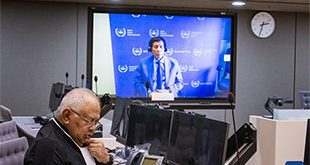
Houston, United States | AFP | All it took was one little call to spur Tom Banning into action, undertaking a giant mission across a very large state — distributing 525,000 masks to health care providers around Texas, a sprawling landmass roughly the size of France.
In mid-March, amid the emerging US coronavirus outbreak, the doctor was contacted by a golf buddy who had come into possession of hundreds of thousands of professional-grade masks from Mexico and wondered whether Banning knew anyone who might be in need.
“The whole state is looking for this PPE!” Banning said, using the acronym for personal protective equipment — vital everyday items such as masks and gowns that health care professionals depend on to protect themselves.
Banning, who is also CEO of the Texas Academy of Family Physicians, had an address book brimming with doctors about to close their clinics for lack of such items.
The next day, Banning went to examine the precious cargo — lo and behold a moving van filled with 350 boxes, each containing 1,500 high-quality masks similar to the N-95 masks recommended by American health authorities.
Thus began the equipment’s odyssey to a constellation of far-flung Texas cities, from San Antonio to Dallas, with a number of rural hospitals in between — and all in one day.
– ‘Better protection’ –
“I got on the phone and immediately started calling some practices that I knew were seeing high volumes of potentially COVID-19 patients,” Banning said.
Jumping in his car, with his 12-year-old son along for the ride, Banning headed to Houston, in east Texas, to drop off a shipment to the team of caregivers tending to the city’s first declared cases.
Meanwhile, with Banning coordinating, a health care network dispatched a driver to take masks to Dallas and San Antonio, while a rural hospital association sent a plane to pick up some 60,000 of the masks.
The father-son duo distributed some 3,000 remaining masks to doctors in the Austin region over the following days.
Erica Swegler, one of those physicians, said it was “very reassuring to both myself and my staff” to have the masks.
Her office had not been able to obtain any professional-grade masks save for a few brought in by patients.
Now her team has four masks per person, which they use in rotation.
“As these were intended to be single-use items, this is not ideal but we feel it gives us better protection than using an inferior mask,” she said.
For the moment, “our only option is to use our current equipment until it is soiled to the point it cannot be used,” she said.
– ‘System design failure’ –
The shipment of masks came from the Mexican border town of Matamoros, but Banning refused to detail their exact origin in order to protect the “safety” of the manufacturer and people bringing them across.
The 47-year-old doctor said, however, that the masks “work great.”
And while they were not certified by the US Food and Drug Administration, having been made in Mexico, “they are a hell of a lot better than a bandana or nothing at all,” he said.
“We wouldn’t put soldiers into battle the way that we’re equipping our healthcare frontline physicians and others,” he added.
Banning said he dreams of federalizing mask supply and distribution — as it stands, US states organize distribution of such resources themselves.
US President Donald Trump said on March 19 that the United States was “not a shipping clerk” and provisioning protective equipment was the responsibility of the state governors, even though the federal government has distributed more than 10 million masks across the country and ordered many more.
Meanwhile, states have been forced to compete in local, national and international markets to obtain masks and ventilators.
Over a 100-day surge of coronavirus cases, US hospitals and medical settings such as nursing homes created demand for approximately 136 million masks, according to estimates by researchers at Johns Hopkins University.
The US shortage points to “a system design failure,” said Banning said, adding: “We’ve got a significant lack of political leadership.”
 The Independent Uganda: You get the Truth we Pay the Price
The Independent Uganda: You get the Truth we Pay the Price


